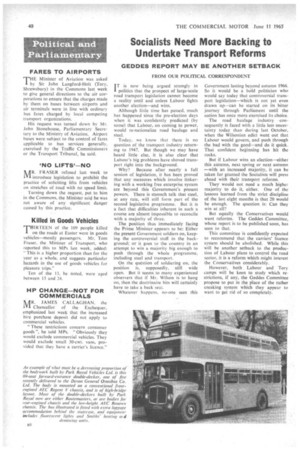Socialists Need More Backing to Undertake Transport Reforms
Page 42

If you've noticed an error in this article please click here to report it so we can fix it.
GEDDES REPORT MAY BE ANOTHER SETBACK
FROM OUR POLITICAL CORRESPONDENT
I T is now being argued strongly in politics that the prospect of large-scale road transport legislation cannot become a reality until and unless Labour fights another election—and wins.
Although little time has passed, much has happened since the pre-election days when it was confidently predicted (by some) that Labour, on coming to power, would re-nationalize road haulage and steel.
Today, we know that there is no question of the transport industry returning to 1947. But though we may have heard little else, it is also clear that Labour's big problems have shoved transport right into the background.
Why? Because after nearly a full session of legislation, it has been proved that any measures which involve tinkering with a working free enterprise system are beyond this Government's present powers. There is staunch talk that steel, at any rate, will still form part of the second legislative programme. But it is a fact that difficulties inherent in such a course are almost impossible to reconcile with a majority of three.
The position thus immediately facing the Prime Minister appears to be: Either the present Government soldiers on, keeping the controversial stuff in the background: or it goes to the country in an attempt to win a majority big enough to push through the whole programme, including steel and transport.
On the question of soldiering on. the position is, supposedly, still wide open. But it seems to many experienced observers that if Mr. Wilson is to hang on, then the doctrinaire bits will certainly have to take a back seat.
Whatever happens, no-one sees this Government lasting beyond autumn 1966. So it would be a bold politician who would say today that controversial transport legislation—which is not yet even drawn up—scan be started on its bitter journey through Parliament until the nation has once more exercised its choice.
The road haulage industry consequently is faced with a little less uncertainty today than during last October, when the Wilsonian edict went out that Labour would govern, and push through the bad with the good—and do it quick. That confident beginning has hit the rocks.
But if Labour wins an election—either this autumn, next spring or next autumn —with an increased majority, it can be taken for granted the Socialists will press ahead with their transport reforms.
They would not need a much higher majority to do it, either. One of the lessons learned from the strict discipline of the last eight months is that 20 would be enough. The question is: Can they win at all?
But equally the Conservatives would want reforms. The Geddes Committee, whose report is to be published soon, has seen to that.
This committee is confidently expected to recommend that the carriers' licence system should be abolished. While this will be another setback to the production of Labour plans to control the road sector, it is a reform which might interest the Conservatives considerably.
However, both Labour and Tory camps will be keen to study which restrictions, if any, the Geddes Committee propose to put in the place of the rather creaking system which they appear to want to get rid of so completely.




























































































































